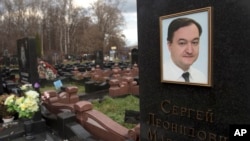British lawmakers are debating legislation similar to the Magnitsky Act in the United States, which allows courts to impose visa bans and asset freezes on Russian officials allegedly involved in the 2009 death of lawyer Sergei Magnitsky. The U.S. Act has since been widened to include anyone accused of human rights abuses. Pressure is now growing for other European countries to follow suit.
Lawyer Sergei Magnitsky died in a Moscow jail in 2009 after spending almost a year behind bars without facing trial. He had been charged with conspiracy, but his supporters say he was targeted by the Russian state after uncovering a $230 million fraud by senior officials, using subsidiaries of the investment fund Hermitage Capital.
An independent investigation concluded he had been tortured by eight prison guards on the day of his death. No one has been convicted.
Hermitage Capital CEO Bill Browder fought successfully to have the Magnitsky Act signed into U.S. law, targeting those involved in the fraud and in Sergei Magnitsky’s death. Now, Browder is fighting to have similar legislation adopted in Britain, and told VOA he is optimistic.
“All the indications are that we have an extremely robust group of cross-party support from all the major parties,” he said.
Browder says Moscow’s actions in Ukraine and Syria are helping his cause.
“The behavior of Russia in the last two years has become so egregious that it has become possible even to convince the executive branch that this is the right thing to do," Browder said.
The proposal for a British Magnitsky law is being debated as an amendment to a wider piece of legislation called the Criminal Finances Bill. Andrew Foxall is head of the Russia program at analyst group the Henry Jackson Society.
“What it seeks to do is broaden out the scope of Magnitsky-related legislation to take in a far more global context,” he said.
Anyone could seek an asset freeze under the proposed legislation, making it a powerful tool, says Browder.
“Private parties, NGOs, can got to the court with pro-bono lawyers and can go after bad guys and get a court designation completely irrespective of the government.”
London is a favorite second-home for many oligarchs from Russia and former Soviet states, some of whom are accused of rights abuses and corruption.
“The National Crime Agency suggests that well in excess of 100 billion pounds ($123 billion) annually of corrupt money flows through the UK,” said Foxall.
Lawmakers are due to vote on the amendment in the coming weeks. Supporters hope its passing could pressure the European Union to adopt similar laws.






